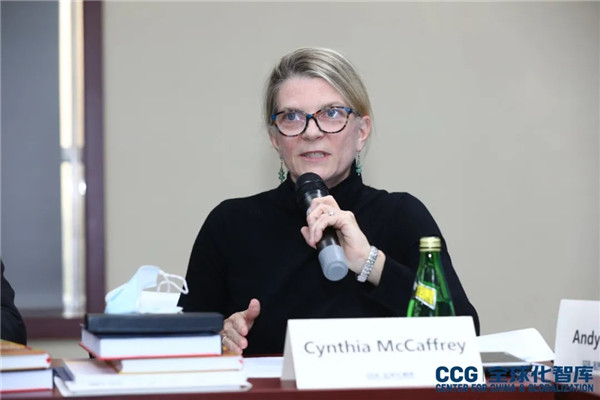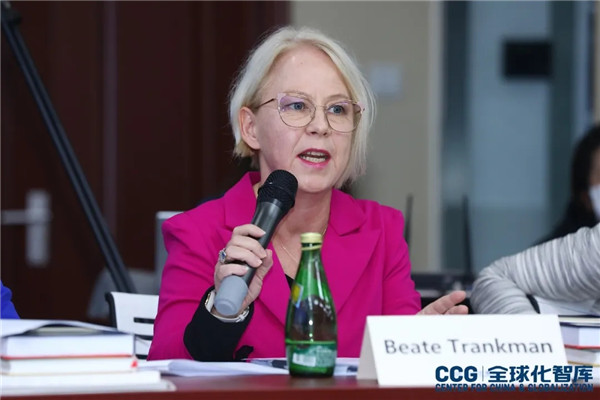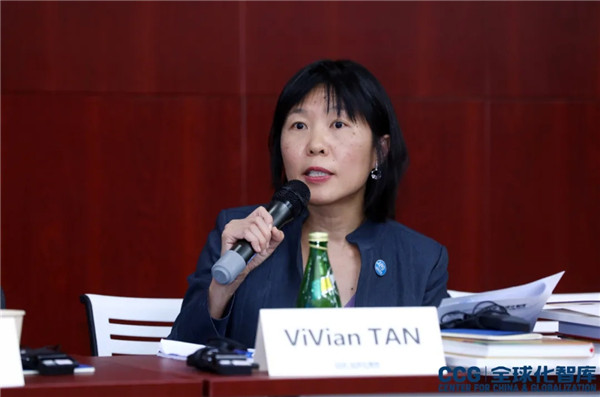Roundtables on China and the United Nations: 50 Years and Beyond
November 02 , 2021
On November 2, 2021, at CCG’s Beijing headquarters, CCG and the United Nations in China co-hosted a symposium to celebrate the 50th anniversary of the restoration of the lawful seat of the People’s Republic of China at the UN.

Over the past 50 years, China has come to play an increasingly major role in the UN as a key driver for global recovery and as a major contributor to the realization of Sustainable Development Goals around the world.
Opening remarks were given by Siddharth Chatterjee, UN Resident Coordinator in China and Dr. Wang Huiyao, CCG President. Special addresses were given by H.E. Wu Hongbo, Special Representative of the Government of China on European Affairs; H.E. Rahamtalla Mohammed Osman, Ambassador of the African Union to China; H.E. Mamadou Ndiaye, Ambassador of Senegal to China; and Tian Lin, Director-General of International Department of the China International Development Cooperation Agency. Closing remarks were delivered by Dr. Mabel Miao, CCG Secretary-General.

The symposium featured two roundtable discussions. “Toward a new development model for common prosperity” featured Cynthia McCaffrey, Representative, UNICEF China; Smriti Aryal, Head of Office, UN Women China; Matteo Marchisio, Country Director and Representative in China, ROK and DPRK, IFAD; Xu Xiuli, Professor and Dean of College of International Development and Global Agriculture (CIDGA), China Agricultural University; Shahbaz Khan, Director, UNESCO Cluster Office in Beijing; and Cindy Mi, founder and CEO of VIPKid.

“Towards 2030 and 2060: sustainable development and climate” featured Justine Coulson, Representative for China and Country Director for Mongolia, UNFPA; Beate Trankmann, Resident Representative at UNDP China; H.E. Wang Hua, CCG Senior Fellow and Deputy Secretary-General, China Foundation for Peace and Development (CFPD); H.E. Tania Romualdo, Ambassador of Cape Verde to China; and Vivian Tan, Deputy Representative, UNHCR.
Roundtable 1: Toward a new development model for common prosperity
“Reduce inequality within and among countries”, which lies at the heart of UN’s 2030 Agenda for Sustainable Development, is a priority for most countries of the world. China’s recent establishment of the long-term goal of common prosperity, referred to as a means to “properly deal with the relationship between efficiency and fairness”, aims to strike a balance between reducing inequality and maintaining economic growth. A critical part of addressing inequality is enhancing strategies for rural and agricultural development.
Progress towards the first SDG, “End poverty in all its forms everywhere”, has been uneven across the globe. While alleviating extreme poverty was achieved ten years ahead of the schedule in China, many parts of the world are lagging behind, caused by factors including the lack of public infrastructure and inadequate access to education. In the meantime, COVID-19 has significantly hindered the progress of ending poverty, drawing attention to issues such as the unequal distribution of public health resources and highlighting the need for a sustainable recovery.

1. Cynthia McCaffrey, Representative, UNICEF China, said that the UN Charter is a roadmap for how we move forward with common understanding to put in place the right programs, policies, and guidelines in order to truly realize every single child’s rights and to advance those rights. Cynthia mentioned three things to illustrate what UNICEF has done with the government of China. First, China and UNICEF are working on creating equal access to quality services in order to advance the rights of children. The second way is to have equal access for all children to social security benefits, the idea of which is to integrate financial investment with the services provided to children. The third thing is investment throughout entire childhood, from the earliest days all the way through adolescence. According to Cynthia, UNICEF is working with the government to continue investing in systems of education and learning that go beyond middle school into high school, creating robust opportunities.

2. Smriti Aryal, Head of Office, UN Women China, spoke on the importance of gender equality and women’s empowerment in common prosperity and achieving the SDGs. Smriti highlighted three considerations from the perspective of gender equality and women’s empowerment. The first one is that empowering women in the economy and closing gender gaps in the world of work is a precondition to achieving common prosperity and the 2030 Agenda for Sustainable Development.
Secondly, expanding care services as a global public good and increasing social security benefits to informal sector workers is another important stepping stone towards the common prosperity agenda. According to UN Women’s global analysis, enhancing public investment in care services could increase jobs by 40-60%, which would address the deficit of care support. Finally, Ms. Aryal stressed that development financing for gender equality and SDG 5 is relatively low, while needs have widened due to the impact of the COVID-19 pandemic. One way to address the deficit is by innovating public financing and fiscal policies, the other is to boost public-private partnerships by encouraging industries and companies to play a greater role in broadening investment for the SDGs and socially-conscious business practices.

3. Matteo Marchisio, Country Director and Representative in China, ROK and DPRK, IFAD, talked about inequality and the divide between rural and urban areas. Matteo mentioned labor migration from rural places to urban cities, especially the youth population, which is not a socially sustainable phenomenon in the long term. This issue was also mentioned in a policy note on poverty alleviation and rural revitalization in post-2020 China by IFAD. However, Mr. Marchisio attributes this situation to the lack of jobs and development opportunities in remote places. In order to deal with this regional inequality, Matteo suggests that China needs to invest more in rural areas, to create attractive employment and investment opportunities. Moreover, he said it is likely that a full transition to large-scale and mechanized agriculture will take time in China, because of which, he proposed a dual strategy to integrate smallholders into modern agriculture while releasing labor currently engaged in smallholder farming to more productive and remunerate activities and new opportunities. He summarized his speech by suggesting that China needs to focus on creating more opportunities outside the agricultural area.

4. Xu Xiuli, Professor and Dean of the College of International Development and Global Agriculture (CIDGA), China Agricultural University, noted that the priority now is to spread new development knowledge. She took her organization as a case study to explain this process. From 2001-2009, China Agricultural University started a program in Tanzania which aimed at poverty alleviation and capacity building. They linked different government officials with the local communities to improve efficiency. Finally, she summarized that China should share more global development experiences and foster a new development path through south-south cooperation.

5. Shahbaz Khan, Director, UNESCO Cluster Office in Beijing, introduced that there are 56 UNESCO World Heritage Sites in China as of 2021, with the latest one in Quanzhou. They were granted this status not just because of their beauty but also because of their sustainable development linked to education, rural revitalization, protection of species, science, and culture. He emphasized the new development model with three important pillars: rural revitalization, ecological civilization, and shared prosperity. Prof. Khan said China has established an online platform for heritage education to promote the process of rural revitalization. Ecological civilization is also a new model. He mentioned that in ecological civilization, it is very important for us to achieve coexistence between nature and humans. New ecosystems and new rural livelihoods need to be created. Finally, for shared prosperity, China is actively contributing to UNESCO centers and the development in the Southern Hemisphere.

6. Cindy Mi, founder and CEO of VIPKid, contributed her idea of common prosperity education. She has been working in the education business to promote equitable education and life-long learning for all. With her personal life and working experience, she summed up three challenges related to common prosperity education. First is cross-cultural connection. Covid-19 has brought great difficulties for transnational education communication, however technological platforms have made cross-cultural connection much easier and will be a popular trend. The second issue is the challenge of the digital literacy divide for learners and teachers. She noted that with the help of technologies and the private sector, online teaching can help to overcome the digital divide and create a world-class sector where knowledge could be shared among teachers and learners alike around the world. The third challenge is social responsibility. In order to form better common education, social responsibility is salient for private sectors and individuals to set their missions in accordance with the goals for all human beings. In the end, she expressed her gratefulness for this discussion.

This roundtable was moderated by Andy Mok, CCG Senior Fellow.
Roundtable 2: Towards 2030 and 2060 – sustainable development and climate
2021 is a crucial year for addressing global environmental issues. During COP15 and COP26, systematic changes and concrete plans are called for to avert the climate catastrophe.
In the fight against climate change, reconciling the relationship between nature and economic development remains a crucial question for China. In line with the Paris Agreement, President Xi has outlined landmark targets for China to peak its carbon dioxide emissions by 2030 and achieve carbon neutrality by 2060. As China is poised to embrace multilateralism on the road towards a green future, carbon neutrality will create numerous opportunities for partnerships in the future.

1. Beate Trankmann, Resident Representative at UNDP China, explained how the UNDP’s role has evolved from providing training and support on grass-roots poverty alleviation programs when it first opened its China office in 1979, to now having a greater focus on policy advice that addresses the frontier issues of China’s development journey. These include the green economy transformation, SDG financing, digitalization and data governance, and South-South Cooperation. In particular, she emphasized the UN and China’s central role in fighting climate change and the importance of international cooperation. Pointing to China’s 2030/60 carbon pledges as key commitments, she referenced the 1+N strategy as an important opportunity to make further progress towards carbon peaking and neutrality. Highlighting the need to finance the response to climate change, she suggested three specific actions that will be required amongst others, and which the UNDP stands ready to support: a) redirecting public investments and government budgets from climate/nature-negative to climate/nature-positive, b) leveraging market tools like carbon pricing to incentivize sustainable management and c) creating policy incentives for corporate investments into green development.

2. Justine Coulson, Representative for China and Country Director for Mongolia, UNFPA, emphasized the connection between health and climate change and its effects on people and the possible solutions towards these issues. Coulson praised China’s great achievement in poverty alleviation, and she encouraged the Chinese government to share the expertise gained in this process. Coulson stressed tight linkages between climate change and its effects on people, as well as the omission of this topic at grand global climate summits.

3. H.E. Wang Hua, Deputy Secretary-General of China Foundation for Peace and Development (CFPD), former Ambassador to the Republic of Guinea-Bissau, and CCG Senior Fellow, insightfully pointed out the urgency of tackling climate change and fostering substantial development in his three experiences in poverty alleviation. He mentioned that cooperation between the Chinese government and the UN in introducing technology greatly accelerated the process of poverty alleviation.

4. H.E. Tania Romualdo, Ambassador of Cape Verde to China, in her statement paid stress on the significance of sustainable development and the urgency of taking measures towards climate change, for not only African countries but also the rest of the world. Apart from the negative effects that COVID has brought to the world, Amb. Romualdo also mentioned the positive impact— that nature has recovered to some extent while many people were confined to their homes.

5. Vivian Tan, Deputy Representative, UNHCR, talked about one of the most overriding effects of climate change — the displacement of people. Tan pointed out not only the direct effect of climate change – abnormal extreme weather such as typhoons – but indirect impacts such as food shortages and social tensions, which have contributed to the refugee problem. Also, she highly praised China’s contribution to the world on climate change issue and proposed some feasible resolutions that the China government can make use of in tackling the negative effects of climate change.

This roundtable was moderated by Zoon Ahmed, CCG Fellow.






